Food for thoughts
Aug. 28, 2024
Editorial responsibilities : Direction of the collection "Cours-Série Droit privé", Editions Dalloz (33)
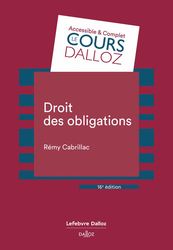
► Référence complète : R. Cabrillac, Droit des obligations, Dalloz, coll. "Cours Dalloz-Série Droit privé", 16ième éd., 2024, 484 p.
____
► Présentation de l'ouvrage : Parfaitement à jour des réformes récentes, le manuel de Rémy Cabrillac raconte en 450 pages le droit des obligations comme une matière vivante et quotidienne. Afin que cette matière demeure compréhensible, sa présentation en demeure classique, une première partie de l'ouvrage est consacré aux sources, la seconde traitant du régime.
Pour le faire, cet ouvrage désormais classique expose ainsi les actes juridiques, les quasi-contrats, la responsabilité civile extracontractuelle, puis les modalités, la circulation et l'extinction des obligations.
____
📚Consulter l'ensemble de la collection dans laquelle l'ouvrage a été publié.
____
📚Sont directement corrélés à cet ouvrage :
📕D. Mainguy, Contrats spéciaux
📕J.-B. Seube, Droit des suretés
📕J.-D. Pellier, Droit de la consommation
__________
June 6, 2024
Publications

🌐follow Marie-Anne Frison-Roche on LinkedIn
🌐subscribe to the Newsletter MAFR Regulation, Compliance, Law
____
► Full Reference: M.-A. Frison-Roche, "François Terré. In memoriam", D. 2024, p. 1028
____
🌞read the in memoriam published in the Recueil Dalloz on June 6, 2024 (in French)
________
June 5, 2024
Thesaurus : Doctrine
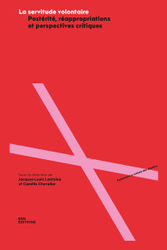
► Référence complète : J.-L. Lantoine et C. Chevalier, La servitude volontaire. Postérité, réappropriation et perspectives critiques , ENS Editions, 2024, 242 p.
____
Lire une présentation de l'ouvrage
____
► Résumé de l'ouvrage : (fait par les auteurs) : La « servitude volontaire » est une formule mobilisée tant dans le champ universitaire que dans le champ intellectuel ou journalistique. Ses usages, parfois référés au Discours de la servitude volontaire de La Boétie et, plus rarement, appuyés sur une lecture précise de ce texte, prétendent situer la source de la domination dans le libre consentement de ceux qui la subissent. Mais cette formule au caractère oxymorique, presque provocateur, occulte le plus souvent les véritables causes de cette apparente volonté de servir. Les explications de ce phénomène, telles que le désir, la coutume, la soumission consentie, la domination symbolique, l’obsequium ou la jouissance dans la servitude, doivent permettre de comprendre ce qui apparaît sinon comme une monstruosité et une énigme. L’étude du monde du travail montre notamment que les analyses en termes de servitude volontaire ne sont pas les plus adéquates. Enfin, si une telle formule peut susciter une prise de conscience, elle ne fournit pas pour autant la clé de l’émancipation.
Feb. 16, 2023
Thesaurus : Doctrine
► Référence complète : J. Habermas, Espace public et démocratie délibérative : un tournant, Gallimard, 2023, 144 p.
____
Lire la présentation de l'ouvrage par Jean-Pierre Gabrielli pour Non-Fiction.
Lire la présentation de Marc Lebiez pour EAN
____
📧Lire l'article écrit à partir de cet ouvrage dans la Newsletter MAFR Law, Compliance, Regulation ; 🔴𝑳'𝒆𝒔𝒑𝒂𝒄𝒆 𝒑𝒖𝒃𝒍𝒊𝒄 𝒅é𝒍𝒊𝒃é𝒓𝒂𝒕𝒊𝒇, 𝒎é𝒕𝒉𝒐𝒅𝒆 𝒎𝒐𝒅è𝒍𝒆 𝒑𝒐𝒖𝒓 𝒍𝒂 𝒎𝒊𝒔𝒆 𝒆𝒏 œ𝒖𝒗𝒓𝒆 𝒅𝒖 𝒅𝒆𝒗𝒐𝒊𝒓 𝒅𝒆 𝒗𝒊𝒈𝒊𝒍𝒂𝒏𝒄𝒆, 6 avril 2023.
________
Oct. 27, 2022
Editorial responsibilities : Direction of the collection "Cours-Série Droit privé", Editions Dalloz (33)
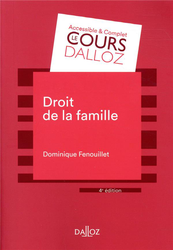
► Référence complète : D. Fenouillet, Droit de la famille, Coll. "Cours Dalloz-Série Droit privé", Dalloz, 1ière éd., 1997, 5ième éd., 2022, 673 p.
____
► Ce manuel à jour des derniers textes s'adresse à tous les étudiants en droit et à tous les praticiens qui actualisent leurs connaissances en droit de la famille.
Il traite dans une première partie des « couples », (marié, démariés, hors mariage), pour consacrer sa deuxième partie à « l'enfant », (rattachement et statut).
Enfin, il finit par développer dans une dernière partie sur « la famille au-delà », (nom, obligation alimentaire et patrimoine de la famille).
____
Consulter l'ensemble de la collection dans laquelle l'ouvrage a été publié.
June 29, 2022
Compliance: at the moment

► Référence complète : Frison-Roche, M.-A., Seuls les droits subjectifs techniques ne sont pas touchés par l'arrêt Dobbs: c'est sur eux qu'il faut construire une nouvelle théorie de l'entreprise, 29 juin 2022.
___
► Introduction de l'article : Tout d'abord il y a deux types de réaction possible face à un événement critiquable. Elles peuvent se cumuler mais chacune prend de l'énergie. Soit critiquer l'événement condamnable (puisqu'il est critiquable, renforçant ainsi la mauvaise opinion que l'on a de lui) ; soit en limiter la portée (puisqu'il est critiquable, autant faire en sorte qu'il ait le moins d'effet possible).
Que l'arrêt Dobbs v/ Jackson rendu le 24 juin 2022 par la Cour suprême des Etats-Unis soit critiquable, tout le monde en est à peu près d'accord. Des centaines de commentaires vont dans ce sens ; des milliers de réactions vont dans ce sens. L'on peut continuer à le critiquer. Cela renforce l'opinion que l'on a déjà. Cela prend de l'énergie.
Peut-être vaut-il mieux utiliser son énergie à limiter la portée de cet arrêt. Mettre son énergie dans cet effort-là. Or cet effort en requiert beaucoup. Donc puisqu'il est acquis que cet arrêt est critiquable, concentrons-nous sur les moyens pratiques d'en limiter la portée.
L'on songe à modifier le Droit français en inscrivant le droit à l'avortement dans la Constitution (I). Mais si l'on revient aux Etats-Unis, car l'arrêt de la Cour suprême n'a pas de portée sur le Droit constitutionnel français, il faut mesurer que tous les droits subjectifs "politiques" non-ancrés dans "l'histoire américaine" sont touchés par l'arrêt du 24 juin 2022, la portée de l'arrêt allant bien au-delà du droit à l'avortement (II). La Cour est donc délivrée de la totalité de sa propre jurisprudence, ce que ne sont pas les cours constitutionnelles européennes, et c'est en cela que l'arrêt est catastrophique car non seulement il touche tous les droits subjectifs "politiques", mais il efface toute la jurisprudence de la Cour concernant les droits subjectifs "politiques" que l'on pourrait dire "nouveaux" (III). Plus encore, trois jours après, la Cour suprême a rendu un arrêt concernant un droit politique ancré dans l'histoire américaine, le droit à la liberté d'expression, qu'elle a interprété très largement, pour bloquer le licenciement d'un enseignant sportif d'une école publique qui faisait des prières sur le terrain de sport, procédant ainsi à un revirement de jurisprudence. La Cour ne serait donc pas non plus liée par sa jurisprudence sur les droits subjectifs politiques ancrés historiquement, pouvant les interpréter d'une façon conservatrice, sans "conserver" l'interprétation "progressiste" que la Cour en avait faite (IV). La solution serait donc de travailler sur ce qui reste : les droits subjectifs non-politiques : or, ce sont des droits auxquels les juristes conservateurs, qui dominent la Cour, sont attachés parce qu'ils sont liés à la liberté contractuelle et à la liberté d'entreprendre. Ils seront en mauvaise position pour les restreindre. Cela désigne ceux qui vont devoir, et pouvoir, défendre les femmes, et plus généralement les êtres humains, aux Etats-Unis : les entreprises (V).
____
Lire les développements de l'article ⤵️
June 21, 2022
Interviews

Référence complète : Frison-Roche, M.-A., L'efficacité de la compliance illustrée par l'affaire Youporn, entretien avec Olivia Dufour, 21 juin 2022.
____
____

Updated: April 4, 2022 (Initial publication: Oct. 4, 2021)
Publications

🌐follow Marie-Anne Frison-Roche on LinkedIn
🌐subscribe to the Newsletter MAFR. Regulation, Compliance, Law
____
► Full Reference: M.-A. Frison-Roche, The Hypothesis of the category of Systemic Cases brought before the Judge, Working Paper, October 2021 and April 2022.
____
► This working paper has served as the basis for an introductory speech 🎤L'hypothèse de la catégorie des causes systémiques (The Hypothesis of the cateory of Systemic Cases), in a more general conference which I coordinated and moderated, 🧱L'office du juge et les causes systémiques, which is part of a general cycle covering Penser l'office du juge, specific conference attending the 9th May 2002 into the Grand Chamber of the Cour de cassation.
This Working Paper was drawn up in October 2021 to build the conference on the assumption that among the diversity of "cases" brought to the courts by litigants, some constitute a specific category: "systemic cases", justifying treatment that is both specific (in that they are systemic, calling in particular for procedural solutions common to all and distinguishable from the treatment of non-systemic cases) and common treatment beyond the diversity of judges who deal with them (judicial and administrative judges, criminal and non-criminal judges, French and non-French judges, judges of the member-States legal orders and European Union judges, etc.).
This working paper does not aim to deal with the whole subject, i.e. both to determine this category of "systemic causes" and the consequences that must be drawn from it for the judge's office, since that is the very purpose of the conference, which is built around several presentations: it aims to deal with the first part of the subject, i.e. the very existence of this new processual category, which is "systemic causes", leaving for other work the practical consequences to be drawn from it in the processual treatment that it calls for.
____
📝This Working Paper is also the basis of a forthcoming article
____
► Summary of the Working Paper: xx
________
Read below the developments⤵️

Jan. 19, 2022
Organization of scientific events

► Full Reference: Frison-Roche, M.-A., coordination and moderation of the conference L'office du juge et les causes systémiques (""The Office of the Judge and systemic causes"), in Cycle of Conferences, Penser l'office du juge ("Thinking the Office of the Judge"), Grand Chamber of the Cour de cassation, Paris, May 9, 2021, 17h-19h.
The conference is held in French.
____
► General presentation of the conference: the conference is based on the intervention of three judges, Christophe Soulard, Fabien Raynaud, and François Ancel, who think and debate among themselves on a hypothesis: the existence of "systemic causes". The hypothesis is that beyond and through the diversity of disputes and cases that are submitted to the most diverse judges, there is a category of cases that are systemic, which means containing in what is submitted to the judge for resolution a system. If such a category exists, which also raises the question of the diversity of systems and the difficulty arising from their submission to rules that are not legal (for example economic, biological, financial "laws", etc.) , then the judge should take this into account, both in the procedure and in the judgment they make on the case and in the way they formulate et restitute this judgment.
____
📝read the presentation of this conference by the Cour de cassation (in French)
📝read the program of the cycle of conferences 2022 (in French)
____
🎥see the conference video (in French)
🎥 see the synthesis video of the conference, made in situ by Marie-Anne Frison-Roche (in French)
____
✏️read the notes taken during the conference to make the synthesis (in French)
📝read the article of Marie-Anne Frison-Roche restituting this conference, published in the Recueil Dalloz (in French)
____
►read the works, basis of the two interventions of Marie-Anne Frison-Roche
🚧 L'hypothèse de la "cause systémique (made before the conference to prepare it), available en English
📝Synthese of the conference (made during the conference)
________

Dec. 24, 2021
Publications

🌐 follow Marie-Anne Frison-Roche on LinkedIn
🌐subscribe to the Newsletter MAFR Regulation, Compliance, Law
____
 ► Full reference: M.-A. Frison-Roche, Conceiving Power, Working Paper, December 2021
► Full reference: M.-A. Frison-Roche, Conceiving Power, Working Paper, December 2021
____
📝 This Working Paper serves as the basis for an article to be published in the collective book drawn up in tribute to Professor Emmanuel Gaillard.
____
► Working Paper summary: In 1985, Emmanuel Gaillard's central work came out under the title Le pouvoir en droit privé (The Power in Private Law)📎
Let's give full force to the original title of the thesis.
The deletion of the term notion perhaps implies that by defining something the essential is done, that there would be something of a pleonasm in aiming at The notion of Power and The Power, as Law likes to economise on words.
But it was indeed a renewed, simpler and more powerful conception of the notion of Power, containing the entire regime necessarily imputed, that this work imposed, henceforth illuminating positive Law. Emmanuel Gaillard's definition, on the other hand, goes beyond Private Law. We would gladly have argued in favour of retaining the heading for the term Notion, proposing instead to dispense with the reference to Private Law alone ....
Perhaps it was because the concept is so vast that in this seminal thesis its scope was restricted to Private Law, since the author already had to account for the sheer multiplicity of manifestations in this part of the legal system; Or perhaps it was because the concept of 'Power' is so familiar in Public Law that it would have needed less definition in Public Law (which, moreover, is so diversely proposed in this more political area, which is already careful on principle to distinguish between powers, which must always be plural in order to be separated), and that it was therefore reasonable to want to arrive at a single concept of Power in Private Law, where the notion of subjective rights is more familiar.
However, Emmanuel Gaillard's definition of Power as a prerogative placed, by legal rule or contract, in the hands of the person invested with them for the benefit, at least in part, of others, covers both Public and Private Law. This even contributes to the solidity of this thesis and explains why it flourishes today in legal systems where the distinction between Private Law and Public Law is weakening.
The power of this definition lies in its simplicity. Simple and brave minds are often the most fruitful. As Dean Gérard Cornu points out in his preface, the author, in particular because he bases himself more on positive law, for example that relating to the powers of corporate officers, does not get bogged down in discussions between authors only to end up preferring one over the other. He arrives at a definition that is close to our everyday experience: the one we experience when we collect an envelope on behalf of someone else and the agent asks us in what capacity we claim to be doing this on his behalf. We then show him our 'power', the legal power to do so for the benefit of the person to whom the letter is addressed, and can thus exercise the power to withdraw the letter, even though it is personal. When legal and common sense come together, it is a good omen, not only in terms of form, because everyone can understand it and the Law must remain comprehensible, but also in terms of substance, because everyone must be able to control the exercise of a power that is exercised for and over others. For this letter addressed to someone else, the person who has been able to take it by virtue of the power conferred on him/her, could just as easily open it and read it, then destroy it or give it to the worst enemy of the person to whom it was addressed. In Power, there is always might to do, and the danger to others that Power contains therefore.
This highly legal definition of Power not only distances the holder from his/her own interests, but also channels the Power thus granted to the person who benefits from it. In this respect, Emmanuel Gaillard not only distinguished between Power and subjective right, but also identified the right amount of power required for this power to effectively fulfill this 'Mission', through the notion of abuse of power, when the holder uses for other beneficiaries this power that was conferred on him/her for this sole purpose.
What is more, this concept makes it possible to distinguish Power from discretionary force, because the holder of Power thereby exercises factual , by acting for others, deciding for others, deciding on others. Because Power is inseparable from might, but might must remain the means of power and no more, the Law shall produce the antibodies that are not only the theory of abuse of power but also an Ex Ante responsibility that accounts must always be rendered, either to the other for whom everything is done or to a third party. For this third party is often there from the outset, the guardianship judge for example: because the Power was put in place because of the beneficiary's weakness, both in himself/herself and because of the situation, an impartial and disinterested third party is needed to ensure proper execution from the outset, without there even being a dispute. In this respect, how useful this thesis is for thinking about what Supervision is today!
This thesis, so clear, so simple and so strong, goes beyond Private or Civil Law. It is both much more restrictive than the more factual and political definition of Oower, which would be the ability to do something, and much broader than the usual definitions, since it embraces and legitimises de jure all situations where a person acts legally for the benefit of another. Dean Cornu shows, moreover, in two sentences that such a notion of power also captures the office of the judge, who has power over others only to serve them 📎
Moreover, Power thus contains its own limit in its very definition, since others are present in it: the holder has power only to serve others. From then on, it is only a power because it is a kind of Charge. Emmanuel Gaillard immediately uses the term: "Un individu se voit confier une charge qu'il exerce dans un intérêt au moins partiellement distinct du sien propre" ("An individual is entrusted with an office which he exercises in an interest at least partially distinct from his own") 📎
This definition offered by Emmanuel Gaillard in 1981, anchored in Private Law only insofar as it is the entire legal system, is premonitory of the Regulatory and Compliance Law as it unfolds today. It would be enough to continue the Gaillard's sentences, as if they had been half-written, to finish them 40 years later and find in them the mechanisms of Supervision of companies by public authorities which are now in place not to reduce their power but to ensure that they exercise it for the benefit of others 📎
The definition of Power thus conceived contains within itself its regime and enables us to anticipate it better today: because the holder exercises Power only for others, at least partially, he is consubstantially accountable for it, responsibility being only one form of this accountability; because this service must be effective and others must benefit fully from it, because unlike the subjective right which allows the holder freely not to use his might, Power has never been the 'most absolute' availability to use his/her might: it is even the opposite. It is the expression of a Power assigned to a purpose, compelling the holder to use his/her Power to that end. But it is equally necessary for the holder to have all the might to do so, otherwise the very notion of 'Power' is meaningless. This is the definition that should be given to the principle of Proportionality: the person on whom the Power rests must have not more power than is necessary, but all the power necessary to achieve the Monumental Goals for which the Power has been entrusted to him/her, so that others may derive full benefit from it (II).
In today's positive Law, the definition of Power as a Duty is found not only in Private Law but also in Public Law, not least because pure might, i.e. those that do not account for the use of their might, are in decline while concern for others is on the increase. The days of discretionary powers are over, and the increased independence of those who exercise Power over others requires them to be accountable. Beyond this Accountability, the personal Responsibility of those who have the Power to serve others is being established. But, no doubt because the Law is slow to evolve, the correlative idea that the holder of Power must have all the powers required to carry out his/her mission is less entrenched: As Emmanuel Gaillard has shown, the Law has only gone part of the way in sanctioning excesses of power, when the holder uses his/her power for other goals, but it has not yet clearly established that the holder - sometimes forced - of a Power is legitimate in using all the means required to achieve the result for which this Power, i.e. a charge and a duty, has been conferred on him/her.
No doubt we need to read Emmanuel Gaillard's thesis again in all its potential, to imagine the reading we could do today of what he could have written as if on blank pages that would write themselves, a magical thesis where everything is already there, a thesis so short (250 pages) and so beautiful, so dense that it already contains the Law of the Future. The Law of the Future 📎
____
Lire les développement ci-dessous⤵
Gaillard, E., Le pouvoir en droit privé, préf. Cornu. G., coll. ..., Economica, 1985.
Gaillard, E., La notion de pouvoir en droit privé, thèse .... ;
"En droit processuel, l'office du juge aurait donné à l'auteur un renfort. Pour le juge, il n'est point de pouvoir sans devoir. Au-delà de la distinction de ce qu'il a obligation de faire ou faculté d'apprécier, il y a toujours, au creux de ce qu'il peut, le sceau de ce qu'il doit, un devoir gardien - comme un âme - de l'exercice du pouvoir." (p.5).
n°3, p.9.
🕴️J. Carbonnier, 📗Essai sur les lois, 1992 (on the guardianship).
S. in a general way, 🕴️M.-A. Frison-Roche (ed.), 📕Régulation, Supervision, Compliance, 2017.
Cornu, préface précitée : "Tous les pouvoirs sont, à double face, des pouvoirs-devoirs" (p.5).
On Compliance Law as a Law of the Future, s. 🕴️M.-A. Frison-Roche, 📝Compliance Monumental Goals, beating heart of Compliance Law, in 🕴️M.-A. Frison-Roche (ed.), 📘Compliance Monumental Goals, 2023.
On the consequences for Liability Law, which is now looking to the Future, s. 🕴️M.-A. Frison-Roche, 🚧Ex Ante Responsibility, 2021.
Sur la notion de "Responsabilité Ex Ante", v. Frison-Roche, M.-A., La responsabilité Ex Ante", in Archives de Philosophie du Droit, La responsabilité, 2022.

Updated: Sept. 25, 2021 (Initial publication: March 25, 2021)
Publications

 ► Référence complète : Frison-Roche, M.-A., Instituer l'insécurité juridique comme principe, outil de prévention des crises systémiques catastrophiques totales, document de travail, mars et septembre 2021.
► Référence complète : Frison-Roche, M.-A., Instituer l'insécurité juridique comme principe, outil de prévention des crises systémiques catastrophiques totales, document de travail, mars et septembre 2021.
____
► Ce document de travail fait suite à deux précédents documents de travail, réalisés pour le colloque qui s'est tenu à la Cour de cassation le 22 mars 2021.
Le premier avait été conçu et en partie réalisé longtemps avant sa tenue pour traiter le sujet selon les canons habituels attendus ;
Le second a été élaboré le veille de sa tenue sur 4 cas car la disparition de mes serveurs en raison d'un incendie, ayant également touché les copies de ceux-ci ne me permettait pas autre chose, les organisateurs m'ayant demandé de maintenir pourtant ma participation, ce dont je les remercie 📎
Le présent document de travail a été élaboré après la tenue du colloque afin que les organisateurs de ce colloque, au thème si aventureux, ne pensent pas qu'ils ne pouvaient pas compter sur moi.
Ce document de travail vise à dépasser ces avanies et à opérer la connexion du sujet pour lequel une contribution m'a été demandée (la crise économique) avec le sujet plus général qui me retient par ailleurs : la construction de la nouvelle branche qu'est le Droit de la Compliance, pourquoi le faire et comment le faire.
____
Introduction : Comme à tous, ce sujet de "L'insécurité juridique" me pose difficulté. Parce que, n'étant pas grand personnage solitaire affrontant l'inconnu, comme tous les autres je voudrais plutôt la sécurité que l'insécurité, et tous les mots qui ne commencent pas par une négation : je voudrais le connu plutôt l'inconnu, je voudrais être comprise qu'incomprise, et ce n'est plus par confort que par urgence morale je voudrais vivre dans un monde juste plutôt que dans un monde injuste. C'est d'ailleurs pour cette dernière raison que je vais affronter l'aventure de l'Insécurité juridique comme principe premier, et non pas comme exception au principe de la Sécurité juridique 📎
Cet ajout du "in" signale paradoxalement un retranchement : le "in" montre ce qui manque, comme le monde blessé qu'est le monde injuste. Me voilà invitée à traiter un sujet par avance abîmé, car l'insécurité juridique c'est déjà comme une agression : un monde amputé de sa sécurité, comme c'est désagréable.
C'est encore plus vrai pour "l'insécurité juridique". En effet, la notion fait face à la "sécurité juridique", cette sorte d'apport spécifique que le Droit offre au monde. La "sécurité juridique" est aujourd'hui comme un Totem, qui serait indissociable du Tabou de l'Insécurité. Dans le monde juridique épuisé dans lequel nous ne serions plus aptes qu'à proposer quelques notions procédurales, surtout pas de notions substantielles car immédiatement taxées d'être trop politiques 📎
La sécurité juridique, parce que les systèmes juridiques n'auraient plus que cela à offrir, revendiquant par ailleurs leur neutralité et se rejoignant donc sur cette constance, cette cohérence, et cette confiance produites par cette sécurité, est notre nouveau doudou.
A cela, l'on apporte nuances dans les modalités, en soulignant que les circonstances changeantes de la vie exigent un peu de flexibilité, que le pragmatisme et des situations concrètes et particulières qui sans cesse varient impliquent de prévoir dès aujourd'hui que demain le contexte aura changé : il faut organiser de la prévisibilité dans le changement. De cela, le Droit souple s'en charge, les lignes directrices étant les nouvelles voies romaines qui nous montreront le chemin. Sécurité et flexibilité, dans un pragmatisme qui voit dans tout principe substantiel un signe de rigidité, voilà notre nouveau mantra.
L'insécurité juridique est ainsi notre Tabou, dont les admissions justifiées seraient autant d'hommages rendus au Totem de la sécurité juridique, Totem et Tabou se renforçant toujours. Il y aurait donc imperfection du système juridique si l'on haussait l'insécurité au rang de véritable principe. C'est pourquoi lorsqu'on fait l'effort de parler d'insécurité juridique, on semble ne le faire que sur le mode de l'exception : l'insécurité juridique, cela serait ce qu'il est admissible de supporter comme exception légitime au principe de la sécurité juridique 📎
L'on aura donc tendance à traiter de l'insécurité juridique comme une sorte de principe supportable lorsque quelque chose justifie qu'on porte atteinte au véritable principe premier qu'est la Sécurité juridique. C'est ailleurs ainsi le plus souvent qu'on l'aborde . Ce n'est donc pas le traiter comme un véritable principe, juste comme une exception supportable.
Voilà pourquoi l'on m'a demandé d'examiner si l'insécurité juridique était supportable, admissible, lorsqu'il y a crise économique. Sans doute parce que lorsqu'il y a crise économique, alors tant pis les principes doivent un peu baisser pavillon et l'on fait avec les moyens du bord en admettant des exceptions, bien qu'avec beaucoup de réticences et de regrets 📎
L'insécurité juridique n'aurait donc qu'un temps, parce que par nature la crise elle-même n'a qu'un temps. La fin de la crise, la fin des problèmes et d'une situation anormale feraient disparaître le principe d'insécurité juridique, lequel serait donc un principe pathologique.
Mais ce n'est pas parce que cette description semble partagée par beaucoup que ses prémisses soient exacts. En effet, la "crise" est-elle si exceptionnelle que ce qui justifie que l'insécurité juridique, qui permet d'aider à sa résolution, le soit aussi ? Si l'on constate plutôt que la crise est non seulement notre "ordinaire", et qu'en plus notre "ordinaire catastrophique" est "prévisible", voire virtuellement déjà là, et qu'en plus dans le futur, ce qui risque d'arriver est une crise catastrophique totale qui pourrait bien être définitive dans ses effets (ce qui enlève à la crise sa nature temporaire et le retour au "vrai principe" également), alors le principe exceptionnel, cantonné dans la crise, doit sortir de l'hypothèse de celle-ci pour venir pleinement dans le Droit présent afin d'empêcher que se réalise cet ordinaire catastrophique.
Oui, regardons vers le futur : ne sont-ce pas de monumentales crises qui sont devant nous ? Et l'enjeu n'est-il pas d'adopter des principes premiers pour qu'elles n'adviennent pas ? S'il en est ainsi, alors l'absence de changement, la constance et le prévisible, c'est-à-dire le principe même de la Sécurité juridique, si choyé, n'est-ce pas ce qui fait obstacle à la prévention de l'advenance des crises économiques qui nous menacent ? Certes c'est sans doute une crise sanitaire et une crise écologique et climatique qui nous sont devant nous, mais de la même façon la crise économique de 2020 n'est elle-même qu'un accessoire de la crise sanitaire mondiale, prémisses de ce qui pourrait arriver.
Si nous sommes dans cette situation mondiale alors, ce n'est pas une conception procédurale des principes qu'il faut retenir, mais une conception politique. De la même façon, dans cette perspective ce n'est pas en terme d'exception, de "principe exceptionnel" mais bien en terme de principe premier qu'il faut penser l'Insécurité juridique, c'est-à-dire en terme d'éveil et d'aventure, car demain pourrait n'être pas du tout comme aujourd'hui. Seul le principe inverse de l' "Insécurité juridique" pourrait alors exprimer la volonté d'y répondre (II).
_____
► Lire ci-dessous les développements du document de travail ⤵
L'incendie d'OVH peut simplement être pris comme un exemple de crise. V. infra ⤵
Ce qui occupe la seconde partie de la présente étude.
Ainsi le Droit de la Compliance a longtemps été présenté comme une simple procédure d'effectivité des règles, ce qui rassure, plutôt que ce qui est sa définition substantielle, à savoir des "Buts Monumentaux", notamment sociaux et climatiques, qui lui donne toute son ampleur et révèle sa nature profondément politique. V. Frison-Roche, M.-A. ✏️Notes pour une synthèse opérée sur le vif des travaux du colloque : "Les Buts Monumentaux du Droit de la Compliance : radioscopie d'une notion" la notion de Buts Monumentaux du Droit de la Compliance, 2021 ; et voir plus généralement Frison-Roche, M.-A. (dir), 📕 Les Buts Monumentaux de la Compliance, 2022.
Contre cela, Frison-Roche, M.-A., Non, je n'aime pas la réglementation, septembre 2021.
Il en est de même du principe de proportionnalité. Mais là aussi il serait adéquat de penser les choses différemment. Voir une démonstration dans ce sens, Frison-Roche, M.-A., Définition de la proportionnalité et Définition du Droit de la Compliance, 2021.
Pour une description du choc que la loi déclarant "l'Etat d'urgence sanitaire" fit sur la doctrine juridique, Gelbrat, A. et , Etat d'urgence sanitaire : la doctrine dans tous ses états, 2020.
Ce sont souvent dans ces termes que la doctrine s'exprime. Par exemple 📝Kamgaing, P.-C., Crise sanitaire et procédures judiciaires : étude de droit processuel, 2020, évoquant le fait que le droit processuel est "bafoué".
July 23, 2021
Publications

Full reference: Frison-Roche, M.-A., Programme de mise en conformité (Compliance), Dictionnaire de droit de la concurrence, Concurrences, Art. N° 12345, 2021
Read the definition (in French)
Feb. 2, 2021
Thesaurus : 05. CJCE - CJUE
Full reference: CJEU, 2nd of February 2021, DB v. Commissione Nazionale per le Società e la Borsa (Consob), case C‑481/19
Read the opinion of advocate general
Summary of the decision by CJEU:
"Natural persons who are subject to an administrative investigation for insider dealing have the right to remain silent when their answers might establish their liability for an offence that is punishable by administrative sanctions of a criminal nature, or their criminal liability".
To go further, read:
- Frison-Roche, M.-A., Resolve the contradiction between "incentive" and "sanction" under the fire of Compliance Law, 2021
- Frison-Roche, M.-A., Rights, primary and natural Compliance tools, 2021
Dec. 9, 2020
Teachings : Generall Regulatory law

Au sens juridique, la responsabilité désigne le fait de "répondre", mais au sens commun la responsabilité désigne le fait d'avoir du pouvoir et de l'exercer dans les marges que donne la liberté d'action. Les deux sens doivent converger dans un système libéral.
Puisqu'il a été montré que les Régulateurs sont les maîtres des secteurs, ils seraient donc logiques qu'ils sont responsables. Mais, c'est encore un point commun qu'ils ont avec les juges, parce qu'ils sont consubstantiellement indépendants, ils ne peuvent pas voir leur responsabilité engagées. Cependant le droit positif a posé le principe de la Responsabilité de l'Etat du fait de leur Autorités de Régulation, tandis que leur irresponsabilité politique comparée à l'ampleur de leurs pouvoirs a souvent était le ferment de leur contestation.
Par ailleurs, le mécanisme général de la responsabilité est utilisé, notamment parce que les mécanismes du Droit de la Régulation sont eux-mêmes défaillants. En effet, comme l'a montré Alain Supiot, l'on peut "prendre la responsabilité au sérieux" et, si l'on applique cette perspective plus particulièrement à l'espace numérique, cela permettra de pallier les défaillances de la Régulation publique elle-même. En effet, il existe des sortes de "trous noirs régulatoires", dont relève encore notamment le numérique.
Mais cette violence de la responsabilité ainsi conçue ne doit pas s'appliquer à tous les opérateurs économiques. En effet, cette responsabilité "proactive" qui dépasse le mécanisme de l'Ex Post vers l'Ex Ante ne doit s'appliquer qu'aux opérateurs régulés, éventuellement aux "opérateurs cruciaux, pour qu'à travers leur personne, les buts de la régulation soient atteints (mécanisme de compliance). Les opérateurs ordinaires doivent demeurer dans un mécanisme Ex Post, la responsabilité ne devant pas engendrer des "devoirs généraux de prise en charge d'autrui", car l'entreprise ordinaire n'est pas de même nature que l'État.
D'une façon spécifique et au besoin :
D'une façon plus générale et au besoin :
- Accéder au plan général du Cours de Droit Commun de la Régulation.
- Se reporter à la présentation générale du Cours de Droit Commun de la Régulation.
- Consulter le Dictionnaire bilingue de Droit de la Régulation et de la Compliance.
- Consulter la Newsletter MAFR - Law, Compliance, Regulation
Consulter ci-dessous la bibliographie spécifique à cette leçon portant sur la Responsabilité et la Régulation:

Updated: Dec. 3, 2020 (Initial publication: July 15, 2020)
Publications
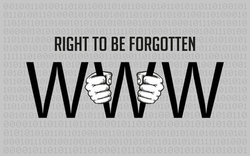
Full Reference : Frison-Roche, M.-A., Rights, primary and natural Compliance Tools, Working Paper, July 2020.
This Working paper is the basis for an article published in the collective book Compliance Tools .
____
There was a time when Regulatory techniques were above all only calculations of the best tarifications, taken up by monopolistic companies, while Compliance techniques were only obedience to all rules governing us. All this could therefore only be business of abacus and badine, used by engineers and consisted only of mechanical reflexes of "conformity" to all kinds of rules with the corset ensuring that everyone is bent in front of them
Systems have since evolved to integrate these prerogatives of each person: rights. Is this evolution really acquired? Maybe more effectively in Regulation Law than in its extension which is Compliance Law. This may be surprising since Compliance Law, in that it extends Regulatory Law in enterprises should, on the contrary, promote rights by meeting the enterprise, which is a group of people ....
In addition, if Regulation has long been the subject of a branch of Law in which rights have full place, the presentation of Compliance as "conformity", that is to say the proven assurance of obedience to all the applicable rules, leaves no space for the prerogatives of people, which appear rather as resistance to the obedience that would be expected of them. There again, the expectation of what would be a good ratio of conformity between behaviors and prescriptions would be obtained by a "design", data processing being the new form of calculation, improved by precision tools where the being human is not required
It would therefore be with regret, and probably because some constitutional jurisdictions still attach some value to fundamental rights that the systems of "conformity" of behavior to the rules make some room for the prerogatives of people, their more essential rights. It is sometimes said that this is part of the cost. It would therefore be as by "forcing" that rights would exist in Compliance systems, a kind of price that the effectiveness of Compliance must pay as a tribute to the Rule of Law principle
If in a poor definition Compliance is conceived in this only "conformity", leading to a landscape in which the behaviors of the people adjust to the rules governing the situations, Compliance being only the most "effective way" to ensure the application of the rules, in a mechanical perspective of Law, then it would effectively be necessary to reduce the prerogatives of people to a minimal part, because any "additional cost" is intended to disappear, even if it is produced here by constitutional requirements. In the looming battle between the effectiveness of the application of rules and the concern for the legal prerogatives of people who should above all obey and not claim their rights, especially their right not to obey , or their right to keep secret in Compliance techniques which is based on the centralization of information, the effectiveness of efficiency could only, by the very power of this tautology, prevail
The defeat would not be total, however, collaboration would still be possible and active between people availing themselves of their rights and Compliance Law. Indeed, in many respects, if rights have been recognized in Compliance systems, it is not only because Compliance Law, like any branch of Law, can only be deployed with respect for fundamental rights. kept by fundamental legal texts, but also because of the effectiveness of rights as " Compliance Tools".
Indeed, because they constitute a very effective "tool" to ensure the entire functioning of a system whose goals are so difficult to achieve, because every effort must be made to achieve these goals, the public authorities not only rely on the power of crucial operators, but also distribute prerogatives to people who, thus encouraged, activate the Compliance system and participate in the achievement of the "monumental goals". Rights can prove to be the most effective tools to effectively achieve the goals set, to such an extent that they can be considered as "primary tools" (I).
But it is necessary to be more ambitious, even to reverse the perspective. Indeed because all the Monumental Goals by which Compliance Law is defined can be reduced to the protection of people, that is to say to the effectiveness of their prerogatives, by a mirror effect between rights. given by Law to persons and the rights which constitute the very purpose of all Compliance Law, in particular the protection of all human beings, even if they are in a situation of great weakness, rights become a "natural tool" of Compliance Law (II).
Rights are the Compliance Law future.
Contre cela, la critique radicale, savante et fondée d'Alain Supiot, dans l'ensemble de son oeuvre et plus particulièrement dans La gouvernance par les nombres, 2015.
Sur la définition de l'entreprise comme un groupe de personnes qui se réunissent pour entreprise, v. le travail de référence d'Alain Supiot, par exemple son article d'introduction "L'entreprise...", dans l'ouvrage qu'il a dirigé L'entreprise dans la mondialisation ...., 2015 ...
Si l'entreprise pouvait renaître comme idée de cristallisation d'une idée commune entre des personnes, naturellement titulaires de droits subjectifs, exerçant ensemble leur liberté d'entreprendre pour réaliser un projet commun, ce qui correspond à la définition classique du contrat d'entreprise donnée à l'article 1832 du Code civil, cela renforcerait considérablement la présence des droits subjectifs dans le Droit de la Compliance et conforterait la nature humaniste de celui-ci.
En outre, dans une telle définition la loi de la majorité, qui n'est qu'une loi de fonctionnement d'une catégorie de sociétés que sont les sociétés de capitaux, deviendrait moins puissante, au profit des "droits propres" de tout associé (au-delà du cercle des sociétés de personnes), sans qu'il soit besoin d'aller chercher au-delà du cercle des associés ou titulaires de titres émis par la société ou l'entreprise (dit shareholders) et d'aller donner le "droit à la parole" à des personnes qui, parce qu'elles sont "concernées" (les "parties prenantes", les skateholders) ont désormais de plus en plus le "droit à la parole".
La Compliance by Design reflète ces tensions. Elles sont particulièrement bien décrites par Cécile Granier. V. ....
Contre cette conception de la légalité, qui prévoit tout et à laquelle il faudrait prouver par avance et que l'on se "conforme" entièrement, ce qui est contraire aux principes mêmes du libéralisme dont le principe est la liberté d'agir et non pas l'obéissance, Carbonnier affirme que les règles sont faites ne pas s'appliquer et qu'elles ne sont que le "mince vernis" des choses, qu'il convenait de se méfier de la "passion du Droit". V. not. son dernier ouvrage Droit et passion du droit sous la Vième République, 1995. Carbonnier est considéré comme le plus grand juriste français du XXième siècle. Il rédigea les lois qui réformèrent en profondeur le Code civil et publia des ouvrages sur "l'art législatif".
Au contraire, l'Etat de Droit n'est pas un coût extérieur au système de Compliance efficace, que celui-ci doit internaliser. Il est le fondement même du Droit de la Compliance. Voir dans ce sens la démonstration faite par le président de la Cour de Justice de l'Union européenne, Koen Laearnt, ..., in Pour une Europe de la Compliance, 2019.
Sur la démonstration comme quoi la Constitution, en ce qu'elle contient de l'incalculable, est broyée dans cette façon de faire, v. Alain Supiot, Intervention 2019.
Oct. 14, 2020
Thesaurus : Doctrine
Référence complète, Société Française de Psychologie Juridique, La psychologie, le droit et la régulation, revue Psycho-Droit, Revue internationale de psychologie juridique, Numéro 5, 2020.
____
V. notamment :
- Farinetti, A., Psychologie juridique et régulation des espèces. Une illustration des rapports entre la psychologie juridique et le droit de l’environnement
____
Accéder à l'ensemble des numéros de la Revue.
_______
Aug. 7, 2020
Thesaurus : 01. Conseil constitutionnel
July 9, 2020
Thesaurus : Doctrine
► Full reference: M.-E. Boursier, "Qu'est-ce que la compliance ? Essai de définition", D. 2020, Chron., p. 1419-1424.
____
► Summary of the article (done by the author, in French): Au-delà de la diversité de ses sources et de ses finalités, de la variabilité de sa valeur normative et des sanctions encourues, apparaît un élément commun à toutes les déclinaisons de la compliance : la méthode par laquelle elle se déploie.
La compliance se définit avant tout comme une méthode, inspirée des théories de la procéduralisation du droit. Elle consiste en une « internalisation », par l'entreprise et dans l'entreprise, de systèmes de conformité (cartographie des risques, procédures, vigilance, alerte) qui conduisent in fine les opérateurs économiques à assister les États dans la réalisation de leurs missions (lutte contre les grandes infractions du droit pénal des affaires internationales comme le blanchiment et la corruption, respect des droits humains, etc.).
________

June 18, 2020
Publications

♾️follow Marie-Anne Frison-Roche on LinkedIn
♾️subscribe to the Newsletter MAFR Regulation, Compliance, Law
____
► Full Reference: M.-A. Frison-Roche, The dreamed Compliance Law, Working Paper, June 2020.
____
This Working Paper, "The Dreamed Compliance Law", is the basis for an article, written in French, "La compliance" (Compliance), inserted in the collective work to be published under the direction of Jean-Baptiste Racine, Le Droit économique du XXIème siècle (The XXIe century Economic Law , in the Serie Droit & Economie, LGDJ-Lextenso, 2020.
________
No one can know what the Law of the 21st century will be. Pretending to know it is just not to realize its ignorance. Why then writing about it, since the future is always surprising?
One can only write about the unknown part of the Law of tomorrow. If the future is then modeled on what was written, so much the better for the prophet, a tribute that can, for example, be paid to Pierre Godé
Lévi-Strauss argued that teaching is defined as dreaming out loud. Teaching and describing the Law of a century that we will never know gives even more freedom to dream about it. This freedom increases when the object is a branch of Law in the process of being born, state of the stammering "Compliance Law" of which some still maintain, as it was made for Regulation Law, that there is not existing. The hand can then, as it pleases, trace its beautiful or hideous features: what face will Compliance Law have, as soon as we assume that it will exist?
It may as well be a nightmare (I) as a happy dream (II).
It is up to us to choose in which category this branch of Law will flourish. Because what we can be sure of is this fulfillment. It is certainly already taking sides to presuppose the very existence of Compliance Law. Not only to consider it possibility with hostility because to be an enemy of something or someone is already to recognize their existence. Before that, two objections radically block the very existence of Compliance Law and their shadow remains in the future of it
Firstly, it is said that Compliance does not come under Law, but for example only ethics since it would consist in keeping well in companies which care about the interest of others or the planet, for example by spontaneous care of the environment; Compliance being a crystallization of social responsibility, the one for which we have our conscience, we express our "raison d'être" and we are not accountable
Second, there would be many Compliance mechanisms but insufficient to constitute a branch of Law. Indeed we would find Compliance in Company Law, Labor Law, Financial Law, Banking Law, Criminal Law, Administrative Law, European Law, International Law, etc.
These classic branches, which have been formed for so long, depending on the point of view adopted, would gain in modernity or be threatened with decay by this kind of extension which will be Compliance. There would thus be as many "little legal sectoral rules" as there are branches of law. These new internal developments would be like a new bud, on which care should be taken - if the tree regains its strength - or a weed to be eradicated - if the French garden loses its perspective.
Thus the matter being scattered as many as specialist lawyers, often criminalists or specialists in banking and Financial Law, then tomorrow all specialists in all branches of Law, this could constitute the most radical obstacle to the constitution of Compliance Law. Indeed, we would come back to confuse Compliance and the "modernization" of Law itself as a whole, since it would only be a question of perfecting each of the classic branches of the legal system.
If we keep in this half-sleep that is any projection in the future the hope of a constituted branch of Law, we must discard these two perspectives of annihilation, either in the total absence of Law or in recovery by all Law. To dismiss the sorrowful spirits who see no future in Compliance and keep only its enemies in the space of this article, let us assume that Compliance Law will exist in the 21st century. In what form and by what means, in the palm of which institutions, in the shadow of which legal system? Since it is a question of projecting ourselves onto the black screen of our nights of dreamy lawyers, let us take the current state only as a trailer. Like the one developed by the genius who by the contempt not only brought down into the flames of hell the cinema which has become a consumer industry with which producers force-feed us but offered us the vision of its future. What is what we see today the trailer? We let our imagination run wild since the trailer films are autonomous works compared to the film which follows them.
We have no idea what will happen and what we are watching from the brief and violent current images of Compliance Law, the cinema of which rather makes a hero of the whistleblower
Everything will depend on the concept that we will retain of Compliance Law. Because the script is not written, because Compliance Law is a Law with a political dimension, that it is defined by the ambitions that we can claim to have by setting monumental goals that we are going to achieve, a claim that will make it one major branch of the Law of tomorrow, or we can abandon any claim, lower our heads and arms, and reject any claim. It is then that the power of Compliance Law, which will be no less great, will turn against us, human beings, as in a nightmare.
Mélanges Pierre Godé, off-trade book, 2019.
Godé, P., Le Droit de l'avenir (Un Droit en devenir), 1999.
It is in particular the idea of the movement of analysis of Law & Literature which poses that by telling the past in one way or another, by thus inventing it, Law, and in particular the Judge, invents the future and being written, creates it. On this movement which was powerful in the United States, v. Cabrillac, R. et Frison-Roche, M.-A., Droit et Littérature, à paraître.
See infra I. Compliance Law as nightmarish octopus.
On the fact that "social responsibility" makes it possible not to be legally responsible, cf. Supiot, A., Du nouveau au self-service normatif: la responsabilité sociale des entreprises, 2004; this is not the subject of this article and this question will not be developed here.
See, for instance, ..., Replace Regulation by norm by Regulation by Data, 2020.
See, for instance, Frison-Roche, M.-A., Compliance Law (monography), 2016 ; Compliance Law, 2020.
On what the cinema does with the whistleblower, with the availability of trailers and extracts from the films, see Frison-Roche, M.-A., introduction of the article The impossible unicity of the legal category of whistleblowers, 2019.
Frison-Roche, M.-A., ... (retrouver sur LinkedIn).
June 18, 2020
Thesaurus : 01. Conseil constitutionnel
Updated: May 20, 2020 (Initial publication: June 11, 2015)
Thesaurus : Doctrine
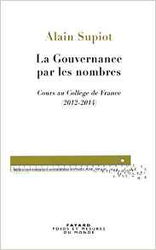
Référence complète : Supiot, A., La Gouvernance par les nombres, col. "Poids et mesures du monde", Fayard, 2015, 418 p.
Lire la conclusion de l'ouvrage.
Regarder les cours d'Alain Supiot reprenant les thèmes de l'ouvrage.
Regarder la présentation vidéo du contenu de l'ouvrage.
Lors de son édition en 2020 sous format de poche dans la collection Pluriel, Alain Supiot a rédigé une nouvelle préface : lire la nouvelle préface.
L'ouvrage a été traduit en anglais par Saskia Brown. Il a été publié en novembre 2017 sous le titre : The governance by Numbers. The Making of a Legal Model of Allegiance.
April 1, 2020
Thesaurus : Doctrine
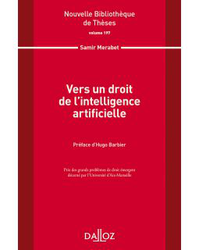
Jan. 15, 2020
Interviews

Référence complète : Frison-Roche, M.-A., Haine sur Internet : il faut responsabiliser les opérateurs numériques, entretien avec Olivia Dufour, Actu-juridique Lextenso, 15 janvier 2020.
Les questions posées étaient :
- Pour lutter efficacement contre la haine sur Internet, la proposition Avia demande aux plateformes d'intervenir sous le contrôle du CSA. Ce système, inspiré de l'économie, est-il transposable dans un domaine aussi sensible que la liberté d'expression ?
- Comprenez-vous la crainte du Syndicat de la magistrature que les plateformes ne se transforment en organe de censure ? N'est-ce pas un défaut de conception du texte ?
- Pensez-vous que l'on puisse se passer de la protection du juge judiciaire en matière de liberté d'expression ? Précisément dans cette loi, estimez-vous qu'il a sa juste place ou que celle-ci devrait être renforcée ?
Lire les trois réponses données dans l'interview.
______
Dec. 1, 2019
Thesaurus : Doctrine
► Référence complète : De Backer, N., « Le principe de proportionnalité à l’épreuve de la liberté d’expression numérique », J.E.D.H., 2019/4, p. 243-277.
____
Nov. 20, 2019
Publications
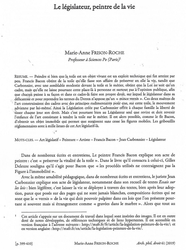
Référence générale: Frison-Roche, M.-A., Le législateur, peintre de la vie, in Archives de philosophie du droit (APD), Tome 61, 2019, pp. 339-410.
Résumé : Peindre si bien que la toile est un objet vivant est un exploit technique qui fût atteint par peu. Francis Bacon obtînt de la toile qu'elle fasse son affaire de préserver en elle la vie, tandis que Carbonnier, avec une semblable modestie devant la toile et le métier, obtînt que la Loi ne soit qu'un cadre, mais qu'elle ne laisse pourtant cette place-là à personne et surtout pas à l'opinion publique, afin que chacun puisse à sa façon et dans ce cadre-là faire son propre droit, sur lequel le législateur dans sa délicatesse et pour reprendre les termes du Doyen n'appose qu'un "mince vernis". Ces deux maîtres de l’art construisaient des cadres avec des principes rudimentaires pour que sur cette toile le mouvement advienne par lui-même. Ainsi la Législateur créée par Carbonnier offrit à chaque famille la liberté de tisser chaque jour son droit. Mais c’est pourtant bien au Législateur seul que revint et doit revenir l’enfance de l’art consistant à tendre la toile sur le métier. Il est alors possible, comme le fit Bacon, d’obtenir un objet immobile permet que surgisse sans cesse les figures mobiles. Les gribouillis réglementaires sont à mille lieux de cet Art législatif-là.
L'article ne comprend pas de reproductions, celles-ci figurent dans le document de travail.